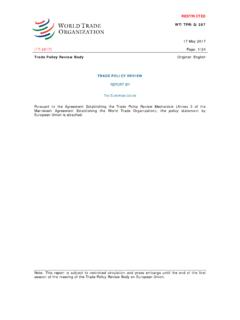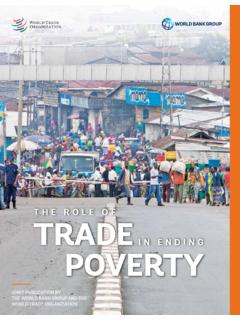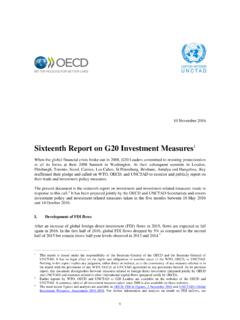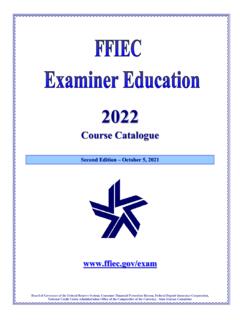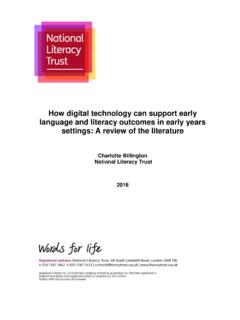Transcription of Closing Remarks by the Facilitator—Mr
1 Closing Remarks by the Facilitator Ms. Zsofia TVARUSKO First and foremost, I would like to express my appreciation to the speakers and panellists for their valuable contribution to our symposium on the occasion of the 20th Anniversary of the Information technology Agreement over the last one and a half days. My deepest gratitude goes to all who attended the symposium and helped to make it such a successful event. The ITA Committee is mandated to oversee the implementation of the agreement and also aims to keep its Members updated on the latest developments in the ICT industry. Hearing and learning from speakers, panellists as well as the audience, has educated me, and all of us here, on how ICT as a development tool can help developing and developed countries alike to promote connectivity. It is important to regularly hear the views from industry, academic experts, and government representatives, on how trade policy on IT products could affect them.
2 The fact that the ITA symposia have become a regular feature of the work of the ITA Committee has helped us to have a better understanding of the rapid changes in this very important sector of the global economy. I am certain that the takeaways from this symposium will further deepen our thinking and stimulate our Committee's work for the future. In my capacity as facilitator of this event, I thought it would be appropriate and useful to summarize some of the themes as well as ideas emanating from this symposium . It will be useful for the ITA Committee, perhaps, to consider reverting to some of these issues in the future. Firstly, I think the symposium has been very effective in meeting its purpose, which is: - 2 - (a) To have an overview of the trade liberalization under the ITA and the evolution of global trade in ICT products over the past 20 years; (b) to examine how ICT, as a development tool, can help developing countries and SMEs in promoting connectivity and achieving sustainable development goals; and can enable diversification, technology upgrading, and innovation; and (c) to discuss what is next for the ITA and the ICT sector.
3 Secondly, following on these themes for discussions, there were a number of important and interesting points raised: All of our speakers have acknowledged that the ITA is a unique instrument in the WTO. It was also highlighted that the WTO matters to the ICT industry, in particular agreements like the ITA or the TFA. They noted ITA's role in removing the tax on ICTs, thereby reducing the cost of key ICT goods and infrastructure that can be used to transform ideas into new business solutions, creating new opportunities for young generations and new business models. They also noted that ICT is a "super capital" that is driving growth in developed and developing countries alike, by raising the productivity and efficiency of all economic sectors in a country, besides the IT sector, including positive impact on education and healthcare sectors.
4 Many speakers have highlighted that information technologies are essential to the achievement of not only the SDG on universal access to internet but all the sustainable development goals. The success of the ITA has led to its expansion, and the importance of the ITA expansion has also been recognized. - 3 - Based on the success of the ITA and the ITA expansion, many speakers were calling for further expansion of the membership. They cited many reasons why developing countries should consider joining the ITA: ITA membership spurs economic growth in many developing economies and can also boost productivity and innovation, support ICT services sectors and exports, spur participation in ICT GVCs and enhance competitiveness of domestic manufacturers. It was also highlighted that the benefits of joining the ITA are mostly related to the consumption, and not to the production of ICTs.
5 It was noted that for many developing ITA participants, ICT exports accounted for a very important share in their total export of goods. Most country-specific cases showed that the ITA has not only helped the development of the ICT sector of these countries, but also their broader economic development through the diffusion of technology , increased investment, innovation, employment and development of high-quality services. However, it was underlined, that in order to be able to reap the benefits of the ITA there is a need for ITA participants to formulate other aspects of their national policy with a view to benefiting from the Agreement. In this regard, some of the speakers also addressed the issue of revenue losses deriving from tariff liberalization under the ITA, which was identified as one of the main preoccupations of developing and least developing countries when joining the ITA.
6 However, it was shown that, while in the short term this could be a problem, in the medium to long term the increased demand of ITA goods would compensate for the loss and also the money saved from tariffs was not lost as it flowed directly within the economy, to companies, including SMEs. - 4 - It was also emphasized that besides the removal of tariffs, that many consider as a prerequisite, other barriers to digital trade need to be tackled in order to make developing countries benefit from the agreement. It was underpinned that special attention needs to be given to the non-tariff barriers in ICT trade, also because they are especially important for SMEs and developing countries. On NTBs, among other issues, there was a repeated call for ensuring the acceptance of test results based on the relevant international standards; the transparency of the regulations and that the conformity assessment is risk-based and based on the supplier s declarations of conformity.
7 E-labelling was also presented as a modern and flexible approach to regulatory markings. Since trade in ICT products is especially affected by NTBs, a call has been made to organise another dedicated workshop on NTBs in the coming year. When looking at the future challenges, the importance of the continuous review of the ITA s scope was highlighted, in order to adapt the agreement to the quickly evolving new technologies. There was also reference to a wider digital agreement, or ITA III, covering new technologies such as virtual reality, artificial intelligence, robotics, etc.; and possibly a wider range of NTBs. All of these are important for the work of our Committee, and some are perhaps more far reaching. All this raises the obvious question of what could or should be the role of this trade policy body in addressing some of these important issues.
8 There were a number of more specific questions raised during each of the panel sessions which may need further examination by the Committee as well. - 5 - Throughout a day and half event, the issue of development was discussed by several speakers. They highlighted the opportunities and benefits that the ITA has already brought to many developing countries and economies. Before ending my Closing Remarks , I would like to convey a special thanks to the interpreters who have been extremely cooperative in staying with us beyond the time allocated. Finally, my deepest thanks are of course reserved for the ITA Secretariat for their priceless contributions and for running a smooth event. Thank you. _____




